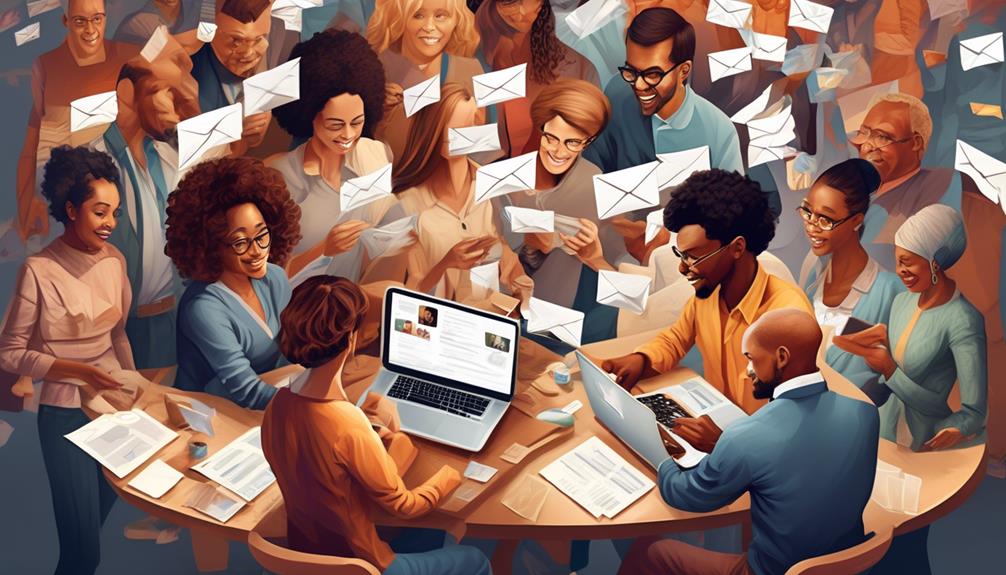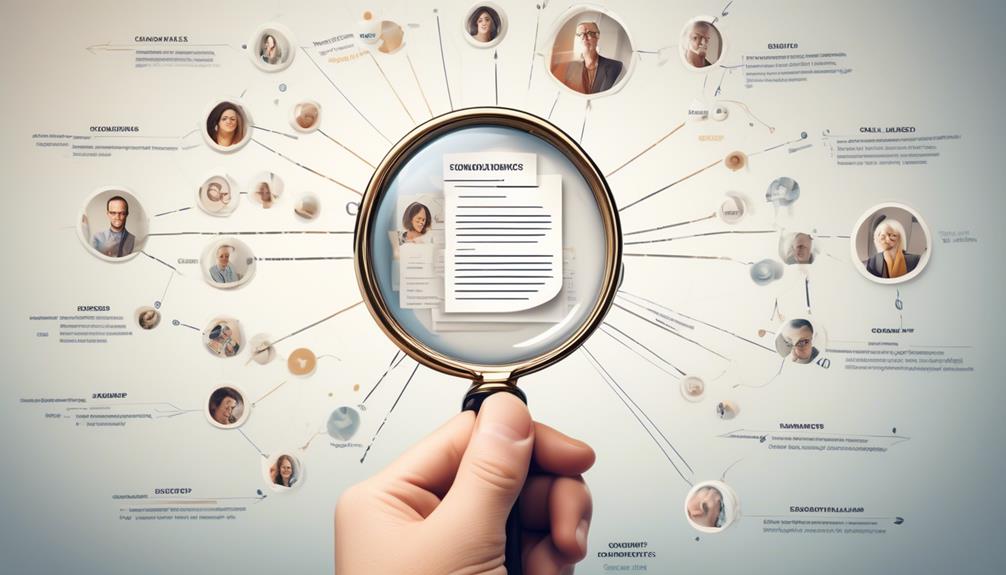Is your email marketing strategy not resonating with your audience? You might be aware of the significance of customization, but are you fully utilizing it to enhance your outcomes?
The key to unlocking higher engagement lies in implementing top email personalization strategies. From segmenting your audience to leveraging automation and dynamic content, there are several tactics that can significantly impact your email marketing success.
But what exactly are these strategies, and how can you effectively implement them to see a noticeable difference in engagement? Let's explore the proven methods that can take your email personalization to the next level.
Key Takeaways
- Personalized emails have a significant impact on customer engagement, increasing open and click-through rates.
- Segmenting email lists and utilizing browsing behavior allows for targeted messaging and customized product recommendations.
- Triggered emails, delivered at the right time with relevant content, create personalized experiences and improve engagement and conversion rates.
- Humanizing the sender's identity through the use of real names, personal anecdotes, conversational tone, profile pictures, and personal signatures can enhance email engagement.
Importance of Email Personalization
The importance of email personalization can't be overstated in today's digital marketing landscape. Personalized emails are a powerful tool in email marketing, as they significantly impact customer engagement. By leveraging customer data, personalized emails can be tailored to individual preferences, behaviors, and interests, thereby increasing open and click-through rates.
This targeted approach not only boosts conversion rates but also strengthens customer loyalty. Furthermore, utilizing data for personalization allows for dynamic content customization, providing relevant offers and recommendations.
Best practices for email personalization include:
- Using personalized subject lines
- Segmenting email lists
- Leveraging dynamic content
- Incorporating personalized product recommendations
- Implementing triggered emails based on user actions
These strategies create a more personalized and engaging experience for the customer, leading to improved email campaign performance.
Additionally, the power of storytelling in personalization builds emotional connections with subscribers, enhances the customer experience, and strengthens brand identity and loyalty. This, in turn, helps differentiate your brand from competitors and drives higher engagement and advocacy.
Segmentation for Personalization

to the audience
Utilizing Browsing History
Based on the insights gained from segmentation strategies, you can now tailor email content based on browsing history to further personalize your messaging and offers. By leveraging browsing history, you can create personalized and dynamic content that aligns with the recipient's interests and needs. Utilizing browsing history allows you to customize product recommendations, craft targeted subject lines and preview text, and offer promotions that are relevant to the individual's recent website interactions.
Email marketing campaigns can be greatly enhanced by incorporating browsing history into your strategies. This information provides valuable insights into the recipient's preferences, enabling you to deliver more engaging and personalized content. By analyzing the recipient's browsing behavior, you can gain a deeper understanding of their interests and preferences, allowing you to tailor your emails to maximize engagement.
Leveraging Triggered Emails

Implement triggered emails based on user actions to send timely and relevant messages. Leveraging triggered emails is a powerful marketing strategy that allows you to deliver targeted and personalized messages to your audience. By utilizing automation, you can ensure that the right content reaches the right people at the right time, increasing engagement and conversion rates.
Incorporate dynamic content in your triggered emails to create personalized experiences for each recipient, making your email copy more compelling and relevant. Leverage behavioral data to tailor triggered emails and recommendations for individual subscribers, making them feel understood and valued.
Additionally, continuously test and optimize your triggered email strategies to ensure that they remain successful and effective in driving engagement.
- Utilize automation to personalize and target specific audience segments with triggered emails.
- Incorporate dynamic content in triggered emails to create personalized experiences for recipients.
- Leverage behavioral data to tailor triggered emails and recommendations for individual subscribers.
- Test and optimize triggered email strategies to continuously improve engagement and conversion rates.
Humanizing Sender Identity
After leveraging triggered emails to deliver timely and personalized messages, the next step is to humanize the sender identity in email communications. Humanizing the sender's identity involves creating a personal connection with the recipient through various strategies. Here are some effective techniques for humanizing sender identity in email communications:
| Strategies for Humanizing Sender Identity |
|---|
| Using the sender's real name and title in the email |
| Sharing personal anecdotes or insights in the email content |
| Adopting a friendly and conversational tone in the email copy |
| Showcasing the sender's profile picture |
| Including a brief personal signature at the end of the email |
Frequently Asked Questions
What Are the 7 Email Marketing Strategies?
To boost your email marketing, there are several strategies you can implement:
- Segment your audience for increased opens and clicks. By dividing your subscribers into smaller groups based on their demographics, preferences, or behaviors, you can send more targeted and relevant emails. This will result in higher open rates and click-through rates.
- Personalize subject lines and content. Personalization is key to grabbing your recipients' attention and driving engagement. Use the data you have on your subscribers to create subject lines and content that resonate with their interests and preferences.
- Utilize behavioral data to tailor email content and recommendations. By tracking your subscribers' actions, such as their past purchases or website browsing behavior, you can send them emails with personalized product recommendations or content that aligns with their interests. This will help to strengthen your relationship with your audience and increase their engagement with your emails.
- Test and refine your strategies. Email marketing is not a one-size-fits-all approach. It's important to continuously test different strategies, such as subject lines, content formats, and send times, to see what works best for your audience. Use A/B testing and analyze the results to refine your email marketing campaigns and improve their effectiveness.
How Can a Company Improve Email Content Personalization?
To improve email content personalization, you should start by segmenting your audience based on their behaviors and preferences. Use dynamic content to tailor each email to the recipient's interests.
Leverage data like purchase history and website interactions to create personalized recommendations. Implement A/B testing to refine your personalization strategies.
Lastly, don't forget to personalize the subject line and sender name for a more engaging experience.
How Does Personalization Increase Engagement?
Personalization increases engagement by tailoring content to your subscribers' preferences and behaviors. It makes your emails more relevant, leading to higher open rates and click-throughs.
By using data-driven insights, you can create targeted messaging and dynamic content that captures attention. This approach fosters emotional connections, builds brand loyalty, and ultimately enhances the overall customer experience.
In short, personalization is a powerful tool for boosting engagement and driving meaningful interactions with your audience.
What Is the Most Effective Email Marketing Campaign Strategy?
The most effective email marketing campaign strategy involves tailoring content to your audience's preferences. By segmenting your email lists and delivering dynamic content, you can significantly boost engagement. Using data to create personalized messages is also crucial in order to provide a more relevant and valuable experience for your subscribers.
Crafting compelling subject lines is another important aspect of a successful email marketing campaign. A catchy and attention-grabbing subject line can increase the open rate of your emails, leading to higher click-through rates and conversions.
In addition to these strategies, storytelling can be a powerful tool in email marketing. By weaving narratives into your emails, you can foster emotional connections with your audience and build brand loyalty.
Ultimately, the key to turning subscribers into loyal customers is building trust and credibility through personalized campaigns. When your subscribers feel that you understand their needs and preferences, they are more likely to engage with your emails and make purchases.
Conclusion
You've learned the top email personalization strategies for better engagement.
Did you know that personalized emails deliver 6x higher transaction rates?
By segmenting your audience, leveraging triggered emails, and humanizing sender identity, you can create a more personalized and engaging email experience for your subscribers.
Keep testing and optimizing your strategies to see the best results!









